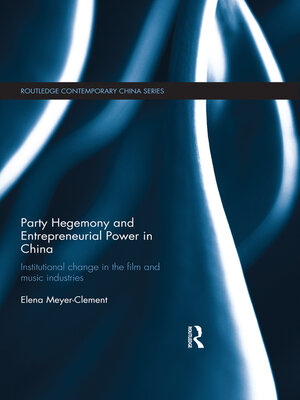Party Hegemony and Entrepreneurial Power in China
ebook ∣ Institutional Change in the Film and Music Industries · Routledge Contemporary China
By Elena Meyer-Clement

Sign up to save your library
With an OverDrive account, you can save your favorite libraries for at-a-glance information about availability. Find out more about OverDrive accounts.
Find this title in Libby, the library reading app by OverDrive.



Search for a digital library with this title
Title found at these libraries:
| Library Name | Distance |
|---|---|
| Loading... |
Economic liberalisation processes and the rapid development of the private sector are widely visible signs of over thirty years of reform policies in the People's Republic of China. Nevertheless, the Chinese Communist Party (CCP) has managed to preserve the basic political institutions of the Leninist Party-state, including its own unrestrained position of political power. Against this background, this book investigates the interrelationship between processes of marketisation and commercialisation, and the stability of the CCP regime.
The aim of the book is to complement existing literature on adaptive governance in China and on the reasons for the CCP regime's relative stability, while providing new information about the relationship between the Chinese party-state and private entrepreneurs. Taking case studies from the film and music industries, the book gives a detailed account of the political and economic history of these industries in China, with special attention given to the role played by private production companies as intermediaries between artistic creation, political and ideological constraints, and the market. A historical institutionalist approach is employed to trace the effect of Chinese policies on popular culture and the institutions of administrative, economic, political and ideological control over the film and music industries back to the 1950s, revealing the mechanisms and prospects of CCP hegemony in the cultural sector.
Examining the effects of the marketisation and commercialisation processes on the communist regime and vice versa, this book also offers a fresh perspective on the origins of today's Chinese popular cultural mainstream. It will therefore be of great interest to students and scholars of Chinese politics, Chinese culture and media and Chinese government-business relations.







